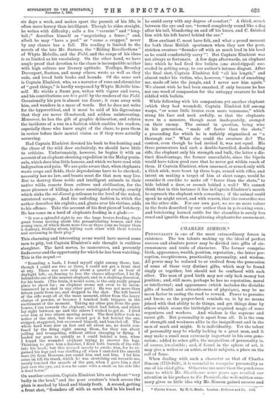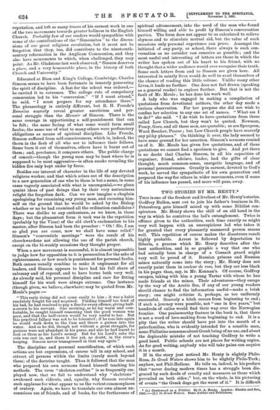CHARLES SIMEON.*
PERSONALITY is one of the most extraordinary forces in existence. The ten talents making up the ideal of perfect success and absolute power may be divided into gifts of cir- cumstances and traits of character. The former comprise birth, appearance, wealth, position, reputation ; the latter per- ception, receptiveness, practicality, personality, and wisdom. All power may be reduced to or evolved from the possession of some of these very distinct gifts, which may be found singly or together, but should not be confused with each other. The man of good birth may not only lack money but position ; and, still more, perhaps he has no reputation, moral or intellectual; and appearance (which includes the divisible gifts of health and attractiveness of physique), may be no mean factor in easing the road to reward. Power to perceive and know, as the prayer-book reminds us, is by no means joined with that ability to do things, and get things done by others which seems the birthright or acquired magic of some organisers and workers. And wisdom is the supreme and rarest gift. But personality is apart from all. It is the sum of strength and weakness alike in the insignificant and in the men of mark and might. It is individuality. Yet the talent of personality may be wholly lacking in a great man, and it may make a small man extremely important in his own gene- ration ; added to other gifts, the magnetism of personality is, of course, irresistible ; and, if found in the sphere of art, it may give a writer or an artist, or their subjects, a place on the roll of fame.
When dealing with such a character as that of Charles Simeon (1759-1836), it is essential to recognise personality as one of his chief gifts. Otherwise (no more than the ponderous tome to which Mr. Shorthouse some years ago recalled our attention in his preface to Sir Percival), the well-written sum- mary gives us little idea why Mr. Simeon gained success and
• Charles Simon. By H. Cl. Menlo. London : Methuen and Co. 1892."Y
reputation, and left so many traces of his earnest work in one of the two movements towards greater holiness in the English Church. Probably few of our readers would sympathise with some of the contributions of the " Simeonites " to the discus- sions of our great religious revolution, but it must not be forgotten that they, too, did contribute to the nineteenth- century reformation in the Anglican Communion, and they also have monuments to which, when challenged, they may point. As Mr. Gladstone last week observed, " Simeon deserves a place, and a very honourable place, in the history of both Church and University."
Educated at Eton and King's College, Cambridge, Charles Simeon seems to have been fortunate in innately possessing the spirit of discipline. A fast for the school was ordered,— he carried it to extremes. The college rale of compulsory communion led to his "conversion." "If I must attend," he said, " I must prepare for my attendance there."
The phraseology is entirely different, but R. H. Froude's Remains scarcely reveal greater asceticism and per- sonal struggle than the Memoir of Simeon. There is the same courage in apportioning a self-punishment that can be felt; the same facing of what some would term small faults; the same use of what to many others were perfunctory obligations as means of spiritual discipline. Like Froude, Simeon suffered from self-consciousness, which is, indeed, the thorn in the flesh of all who are to influence their fellows. Some burn it out of themselves, others have it burnt out of them; and, perchance, it conquers others. The public charge of conceit—though the young man may be least where he is supposed to be most aggressive—is often smoke revealing the hidden fire only kept under by force.
Besides our interest of character in the life of any devoted religious worker, and that which arises out of the description to a new generation of one who to them is but a name, in some cases vaguely associated with what is uncongenial,—we glean quaint ideas of past doings that by their very naturalness relight the forgotten dark. Can we now imagine a chaplain apologising for examining any young man, and excusing him- self on the ground that he would be asked by the Bishop whether or no he had examined all the ordination candidates ? There was dislike to any enthusiasm, as we know, in those days ; but the pleasantest form it took was in the repetition (probably by the Vicar) of the old clerk's exclamation to his master, after Simeon had been the preacher : " Oh ! Sir, I am so glad you are come, now we shall have some relief." Simeon's "conventicle meetings" were the result of his churchwardens not allowing the use of the parish church, except on the hi-weekly occasions they thought proper.
When a new movement is successful, it is almost impossible to judge how far opposition to it is persecution for the sake of righteousness, or how much is punishment for personal faults. Both causes usually combine to make it unpleasant for all leaders, and Simeon appears to have bad his full share of calumny and of reproof, and to have borne both very well.
As already said, his personal discipline and care for fitting himself for his work were always extreme. One instance (though given, we believe, elsewhere) may be quoted from Mr. Morale's pages :—
" This early rising did not come easily to him ; it was a habit resolutely fought for and acquired. Finding himself too fond of his bed, he had resolved to pay a fine for every offence, giving half- a-crown to his servant. One morning, as he lay warm and com- fortable, he caught himself reasoning that the good woman was poor, and that the half-crown would be very useful to her. But this practical fallacy was not to be tolerated ; if he rose late again he would walk down to the Cam and throw a guinea into the water. And so he did, though not without a great struggle, for guineas were not abundant in his purse, and also he bad learnt to look on them as his Lord's money. But for his Lord's sake the coin was cast in, and there it lies yet, no doubt, in the river's keeping. Simeon never transgressed in that way again."
The discipline and personal sanctification, of which such actions are but expressions, of course tell in any school, and attract all persons within the limits (rarely much beyond them) of the doctrine taught. Thus it followed that the man who prepared his own sermons found himself teaching his methods. The term " skeleton-outline " is so frequently em- ployed now, that we fail to understand why " skeletons " awakened such ridicule, and, equally, why Simeon received such applause for what appear to us the veriest commonplaces of oratory. Again, we have to translate our own almost un- conscious use of friends, and of books, for the furtherance of spiritual advancement, into the need of the man who found himself willing and able to profit by Simeon's conversation parties. The form does not appear to us calculated to relieve shyness and to stimulate mutual aid, but the value of such occasions only personal experience can prove. Amongst the initiated of any party, or school, there always is such con- versation as no outsider can conceive as possible ; and the most useful and interesting of letters are those in which the writer has spoken out of his heart to his friend, with no thought that a wider audience would ever recognise their truth. Some such letters from and to Simeon are given here. All interested in saintly lives would do well to avail themselves of the chance of reading this little volume. Unlike many other Lives, it leads no further. One does not feel drawn (speaking as a general reader) to explore further. But that is not the fault of Mr. Moule ; he has done his work well.
A lady who was engaged in making a compilation of quotations from devotional authors, the other day made a curious observation. For her purpose she did not wish to confine her selection to any one set of names. " What am I to do?" she said. " I do wish to have quotations from those called Low Church, but they won't be quoted. Newman, Pusey, Gore, and all those men, are quotable ; so are Spurgeon, Ward Beecher, Pearse ; but Low Church people have scarcely any pithy phrases." On thinking it over, the lady seemed to have some ground for her assertion. Simeon's sermons remind us of it. Mr. Moule has given few quotations, and of these quotations we cannot find a specimen to give. And yet there is no doubt that Charles Simeon, in all his capacities of organiser, friend, adviser, leader, had the gifts of clear thought, much common-sense, energetic language, and of personal persuasiveness. Greatly in earnest, devoted to God's work, he served the sympathetic of his own generation and prepared the way for others in wider movements, even if some of his influence has passed, and more will pass, away.























































 Previous page
Previous page